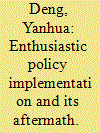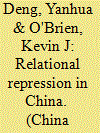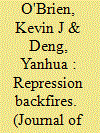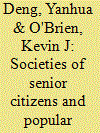|
|
|
Sort Order |
|
|
|
Items / Page
|
|
|
|
|
|
|
| Srl | Item |
| 1 |
ID:
192124


|
|
|
|
|
| Summary/Abstract |
This study examines how power centralization at the provincial level affects the allocation of fiscal expenditures in China. The authors employ a quasi-natural experimental setting formed by a regulation established in 2002 stating that, in general, provincial Chinese Communist Party (CCP) secretaries should be recommended as candidates for chairmen of the Provincial People’s Congress (PPC). An empirical analysis of provincial panel data finds that Party secretaries concurrently serving as PPC chairmen not only inflates the size of local public expenditures, but also limits fiscal expenditures supporting social welfare and livelihood programs due to a tendency among local leaders to invest more in economic programs that could generate short-term economic growth. Furthermore, power centralization and constrained congressional power could reduce the efficiency of local public expenditures.
|
|
|
|
|
|
|
|
|
|
|
|
|
|
|
|
| 2 |
ID:
159845


|
|
|
|
|
| Summary/Abstract |
Many China scholars have explored shirking by local officials and “effective implementation,” but fewer have examined polices that are implemented with great enthusiasm. The Microfinance for Women Programme fits in this last category. Especially in Sichuan, targets for lending were set by the province, exceeded, raised by cities and counties, and then exceeded again. The immediate reason that lending took off in 2012 was the relaxation of collateral requirements that shifted the risk of defaults away from local authorities. But the surge in lending also had deeper roots in the policy's vagueness, institutional incentives, bureaucratic pressure, and local fiscal and organizational interests. Although enthusiastic implementation occurred (and generated much-needed revenues for local governments), the history of the programme also shows that it can be halted, as was the case when instability loomed and the authorities reversed bureaucratic pressure by calling for local cost-sharing and introducing uncertainty over whether interest subsidies would continue.
|
|
|
|
|
|
|
|
|
|
|
|
|
|
|
|
| 3 |
ID:
121206


|
|
|
|
|
| Publication |
2013.
|
| Summary/Abstract |
This article focuses on environmental controversy in a Chinese rural community. It shows that Chinese villagers may protest against anticipated pollution if the environmental threat is effectively framed. In the face of real and serious pollution, villagers may seek to redress environmental grievances by piggybacking on politically favourable issues. However, when the pollution is caused by fellow villagers, environmentally concerned villagers may remain silent owing to the constraints of community relations and economic dependency. These findings suggest that the relationship between pollution and protest is context-dependent.
|
|
|
|
|
|
|
|
|
|
|
|
|
|
|
|
| 4 |
ID:
153572


|
|
|
|
|
| Summary/Abstract |
Using riot police to break up a big demonstration is a familiar occurrence
in many parts of the world, including China. But all protest
control does not involve the use of force, nor is repression always
directed at large groups of people assembled in one location. Some
repression rests on psychological rather than physical coercion and is
aimed at individuals, often in their homes or nearby. This type of
repression may be carried out by people with only a loose connection
to the state’s coercive apparatus, such as relatives, friends, or neighbors
of the target who work for the government or receive benefi ts from it.
“Relational repression” is labor intensive and a sign of a high-capacity
state that uses multiple levers to suppress contention, but has limited
reach and remains insecure about its ability to maintain social stability.
It builds on Maoist and dynastic techniques of control and aims to
extend state penetration into a marketized society whose members have increasingly emancipated themselves from direct dependence on the
government. Relational repression oft en alienates both the agents of
repression and their targets. But it can, at times, be eff ective in demobilizing
resistance or preventing a person from taking part in protest.
|
|
|
|
|
|
|
|
|
|
|
|
|
|
|
|
| 5 |
ID:
139843


|
|
|
|
|
| Summary/Abstract |
When faced with homeowners who refuse to accept appropriation of their property, local authorities often use family ties to extend the state’s reach. To complete urban renewal, municipal demolition offices turn to resisters’ relatives who work for government bureaus, state-owned factories, schools and hospitals. Under pressure and the threat of sanctions, many work-unit members agree to pressure their relatives into signing demolition agreements, often by tapping into “feelings of affection” and emotional blackmail. Beyond emptying a neighborhood, “harmonious demolition” has many consequences: it can turn relatives against each other, lead to divorce, and produce disillusionment and anger. Although “demolition by implicating family members” was banned in 2010, it continues. Using vertical ties to pressure unit members and horizontal ties to influence relatives does not herald a softer authoritarianism, but instead alienates homeowners and work-unit members alike.
|
|
|
|
|
|
|
|
|
|
|
|
|
|
|
|
| 6 |
ID:
124639


|
|
|
|
|
| Publication |
2013.
|
| Summary/Abstract |
Chinese local officials frequently employ relational repression to demobilize protesters. When popular action occurs, they investigate activists' social ties, locate individuals who might be willing to help stop the protest, assemble a work team and dispatch it to conduct thought work. Work team members are then expected to use their personal influence to persuade relatives, friends and fellow townspeople to stand down. Those who fail are subject to punishment, including suspension of salary, removal from office and prosecution. Relational repression sometimes works. When local authorities have considerable say over work team members and bonds with protesters are strong, relational repression can help demobilize protesters and halt popular action. Even if relational repression does not end a protest entirely, it can limit its length and scope by reducing tension at times of high strain and providing a channel for negotiation. Often, however, as in a 2005 environmental protest in Zhejiang, insufficiently tight ties and limited concern about consequences creates a commitment deficit, partly because thought workers recognize their ineffectiveness with many protesters and partly because they anticipate little or no punishment for failing to demobilize anyone other than a close relative. The practice and effectiveness of relational, "soft" repression in China casts light on how social ties can demobilize as well as mobilize contention and ways in which state and social power can be combined to serve state ends.
|
|
|
|
|
|
|
|
|
|
|
|
|
|
|
|
| 7 |
ID:
137499


|
|
|
|
|
| Summary/Abstract |
In spring 2005, villagers in Dongyang County, Zhejiang were unhappy. For four years they had been complaining about pollution emitted by 13 factories located in the Zhuxi Chemical Park, but nothing had been done. So they set up a tent encampment to block delivery of supplies to the factories. At first, they employed restrained tactics, including going about daily life in the tents, badgering cadres sent to demobilize them, and kowtowing. After a harsh repression produced hundreds of injuries and left dozens of damaged vehicles and other evidence of police action strewn about, the tent-sitters switched to more aggressive tactics, including denouncing local leaders, carrying out mock funerals, interrogating factory owners and ransacking the homes of ‘traitors’. The authorities' ill-considered and poorly-timed repression led to tactical escalation, helped draw thousands of people to the scene, and ultimately resulted in the chemical park being closed. This episode speaks to the ‘dissent–repression nexus’ and suggests that repression can be counterproductive when it encourages protesters to ratchet up their tactics and a ‘protest spectacle’ ensues. In today's China, striking displays and theatrical performances, especially in the wake of a crackdown, can attract an audience, bring in financial support and create a carnival-like atmosphere in which popular acclaim, the breakdown of social order and the inversion of power hierarchies grants protesters leverage and induces the authorities to make concessions.
|
|
|
|
|
|
|
|
|
|
|
|
|
|
|
|
| 8 |
ID:
130449


|
|
|
|
|
| Publication |
2014.
|
| Summary/Abstract |
Societies of Senior Citizens (SSCs) are often thought to be non-political organizations focused on community traditions and services for the elderly. In Huashui Town, Zhejiang, however, SSCs took the lead in mobilizing protest and caused 11 factories to be closed. From 2004 to 2005, SSCs helped to fund a lawsuit, engineered a petition drive and organized tent-sitting at a chemical park notorious for its pollution. Huashui's SSCs were effective mobilizing structures owing to their strong finances, organizational autonomy, effective leadership and the presence of biographically available, unafraid older villagers. Skillful mobilization led to efforts to rein in village SSCs and a reorganization which, however, had only a limited effect. SSC experiences in Huashui suggest that organized protest in China is more feasible than often thought and that understandings of protest outcomes should go beyond the success or failure of an episode to explore long-term consequences for the organizations involved.
|
|
|
|
|
|
|
|
|
|
|
|
|
|
|
|
| 9 |
ID:
186619


|
|
|
|
|
| Summary/Abstract |
Using national survey data collected in 2010, this article explores how affiliation with a work unit (danwei, a public or state-owned institution) discourages people from taking part in popular protest in China. Empirical analysis shows that individuals employed in a work unit or with strong social ties (such as a spouse) to a work unit are less likely to protest. The negative effect of work-unit affiliation on protest participation is so effective that it remains significant even when personal interests are at stake. Further analysis indicates that affiliation with a work unit depresses protest participation both directly and indirectly, which suggests that affiliation status is empowering as well as constraining. In addition to quieting people directly, work-unit affiliation is also associated with a higher social status that empowers people to address their grievances before a protest is called for. Despite the dwindling number of people working in work units, the continuing effectiveness of protest control and the amplifying effect of social ties of those who remain in work units still provide a reliable mechanism for limiting popular protest in China.
|
|
|
|
|
|
|
|
|
|
|
|
|
|
|
|
|
|
|
|
|